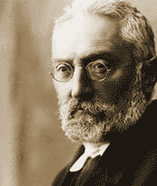Great Throughts Treasury
This site is dedicated to the memory of Dr. Alan William Smolowe who gave birth to the creation of this database.

Miguel de Unamuno, fully Miguel de Unamuno y Jogo
Spanish Essayist, Novelist, Poet, Playwright and Philosopher
"Why do I wish to know whence I come and whither I go, whence comes and whither goes everything that environs me, and what is the meaning of it all? For I do not wish to die utterly, and I wish to know whether I am to die or not definitely. If I do not die, what is my destiny? and if I die, then nothing has any meaning for me. And there are three solutions: (a) I know that I shall die utterly, and then irremediable despair, or (b) I know that I shall not die utterly, and then resignation, or (c) I cannot know either one or the other, and then resignation in despair or despair in resignation, a desperate resignation or are resigned despair, and hence conflict."
"Windelband, the historian of philosophy, in his essay on the meaning of philosophy (Was ist Philosophie? in the first volume of hisPr„ludien) tells us that "the history of the word 'philosophy' is the history of the cultural significance of science." He continues: "When scientific thought attains an independent existence as a desire for knowledge, it takes the name of philosophy; when subsequently knowledge as a whole divides into its various branches, philosophy is the general knowledge of the world that embraces all other knowledge. As soon as scientific thought stoops again to becoming a means to ethics or religious contemplation, philosophy is transformed into an art of life or into a formulation of religious beliefs. And when afterwards the scientific life regains its liberty, philosophy acquires once again its character as an independent knowledge of the world, and in so far as it abandons the attempt to solve this problem, it is changed into a theory of knowledge itself." Here you have a brief recapitulation of the history of philosophy from Thales to Kant, including the medieval scholasticism upon which it endeavored to establish religious beliefs. But has philosophy no other office to perform, and may not its office be to reflect upon the tragic sense of life itself, such as we have been studying it, to formulate this conflict between reason and faith, between science and religion, and deliberately to perpetuate this conflict?"
"Without the inner beauty of a free and harmonious life, ham and eau de cologne can become merely forms of barbarism. Without tolerance and broad spiritual understanding, hygiene will only make for clean animals, very clean and very healthy, but also very animal. External riches will merely smother us, if we do not cultivate inner riches."
"Yes perhaps, as the Sage says, "nothing worthy of proving can be proven, nor yet disproven"; but can we restrain that instinct which urges man to wish to know, and above all to wish to know the things which conduce to life, to eternal life? Eternal life, not eternal knowledge as the Alexandrian gnostic said. For living is one thing and knowing is another; and... perhaps there is an opposition between the two that we may say that everything vital is anti-rational, not merely irrational, and that everything rational is anti-vital. And this is the basis of the tragic sense of life."
"Your lack of faith worries me and your silence insults me."
"You will win but you will not convince."
"Yes, I know well that others before me have felt what I feel and express; that many others feel it today, although they keep silence about it. ...And I do not keep silence about it because it is for many the thing which must not be spoken, the abomination of abominations ? infandum ? and I believe that it is necessary now and again to speak the thing which must not be spoken. ...Even if it should lead only to irritating the devotees of progress, those who believe that truth is consolation, it would lead to not a little. To irritating them and making them say: "Poor fellow! if he would only use his intelligence to better purpose!... Someone perhaps will add that I do not know what I say, to which I shall reply that perhaps he may be right ? and being right is such a little thing! ? but that I feel what I say and I know what I feel and that suffices me. And that it is better to be lacking in reason than to have too much of it."